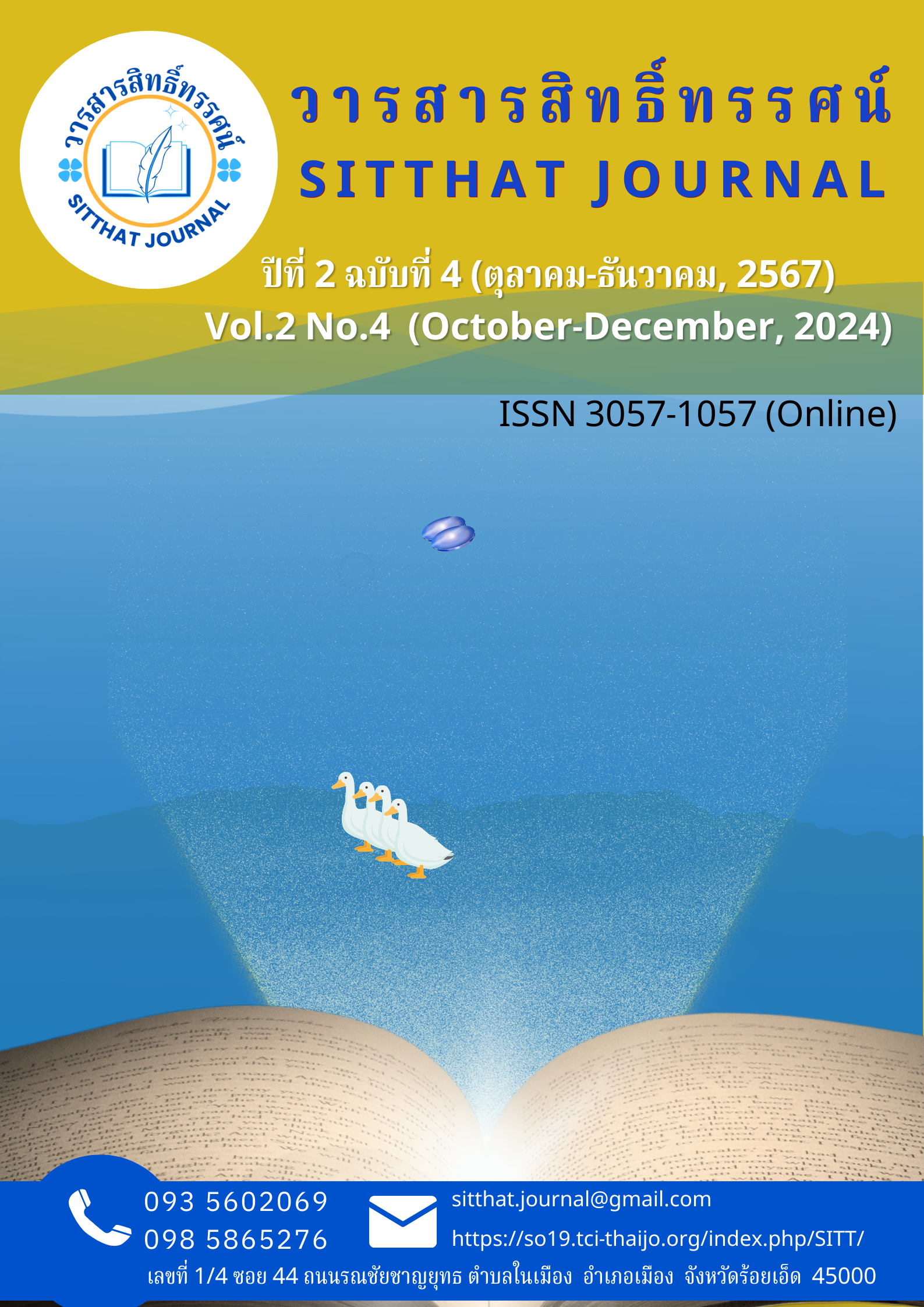ADMINISTRATIVE WORK ACCORDING TO THE PRINCIPLES OF THE DECATHITHARADHAMMA OF THE ADMINISTRATIVE ORGANIZATION UDON THANI PROVINCE
Main Article Content
Abstract
The objectives of this research article are (1) to study administration according to the tenets of Dotsapidharat Dhamma, (2) to study the factors influencing administration according to the tenets of Dotsapitharat Dhamma, and (3) to study guidelines for developing administration according to the tenets of Dotsapitharat Dhamma of the Provincial Administrative Organization. Udon Thani It is both quantitative and qualitative research. The sample population includes Voters in Udon Thani Province totaling 400 people. A group of information providers from government officials in Udon Thani Province totaling 10 people Research tools Including questionnaires and interviews. Statistics used in data analysis include frequency, percentage, multiple regression analysis and descriptive analysis Accompanying the discussion of results The results of the research found that: (1) Administrative work according to the principles of the Dotsapidharatham of the Udon Thani Provincial Administrative Organization. Overall, it is at a moderate level. They can be arranged in descending order as follows: Satisfaction aspect efficiency and effectiveness, respectively (2) Factors that influence the administration according to the principles of the Dotsapidharat Dhamma of the Udon Thani Provincial Administrative Organization. Significantly, these include knowledge and understanding (X1), evaluation (X3), and improvement (X5), respectively and (3) Executives should manage their work with fairness, firmness, and correctness with fairness as the main principle in managing people, managing work, and managing the country Manage work with firmness and courage in making decisions. Not biased and divided into factions Perform duties with integrity and maintain oneself on the principles of Dhamma. Perform duties consistently and take the tenets of Dassabhidharat Dhamma seriously.
Article Details

This work is licensed under a Creative Commons Attribution-NonCommercial-NoDerivatives 4.0 International License.
บทความนี้
References
กรมส่งเสริมการปกครองท้องถิ่น. (2550). การวางแผนพัฒนา. กรุงเทพฯ : โรงพิมพ์ ส่วนท้องถิ่น.
กันตภณ หนูทองแก้ว และพระครูปริยัติกิจจาภิรม. (2560). การประยุกต์หลักทศพิธราชธรรมในการ
บริหารงานของผู้บริหาร เทศบาลเมืองสิงหนคร จังหวัดสงขลา. วารสารมหาจุฬานาครทรรศน์,4(1),
– 61.
กัลยา วานิชย์บัญชา.(2560). การวิเคราะห์สถิติชั้นสูงด้วย SPSS for Window (พิมพ์ครั้งที่ 12). กรุงเทพฯ:
ห้างหุ้นส่วนจํากัด สามลดา.
โกวิทย์ พวงงาม. (2550) .การปกครองท้องถิ่นไทย. กรุงเทพฯ: เอ็กซเปอร์เน็ท.
ณัฐนพิน ทินโน. (2565). การใช้หลักทศพิธราชธรรมที่ส่งผลต่อประสิทธิผลการบริหารงานบุคคลของผู้บริหาร
สถานศึกษา สังกัดสำนักงานเขตพื้นที่การศึกษามัธยมศึกษานครพนม. หลักสูตรปริญญาครุศาสตรมหา
บัณฑิต สาขาวิชาการบริหารและพัฒนาการศึกษา มหาวิทยาลัยราชภัฏสกลนคร.
สนิท จรอนันต์. (2549).ความเข้าใจเรื่องการปกครองท้องถิ่น. พิมพ์ครั้งที่ 2 (ฉบับปรับปรุง). กรุงเทพฯ:
สุขุมและบุตร.
สมภพ บุญล้อม. (2565). การบูรณาการหลักทศพิธราชธรรมในการสร้างความไว้วางใจต่อการปฏิบัติงานของ
เจ้าหน้าที่ปฏิบัติงานพิธีกลุ่มอำนวยการพิธีการศพที่ได้รับพระราชทานกรุงเทพมหานคร. วิทยานิพนธ์
หลักสูตรปริญญาพุทธศาสตรมหาบัณฑิต สาขาวิชาการพัฒนาสังคม บัณฑิตวิทยาลัย มหาวิทยาลัยมหาจุฬาลงกรณราชวิทยาลัย.
Yamane, Taro. (1973). Statistics an introductory analysis. New York Harper & Row.


